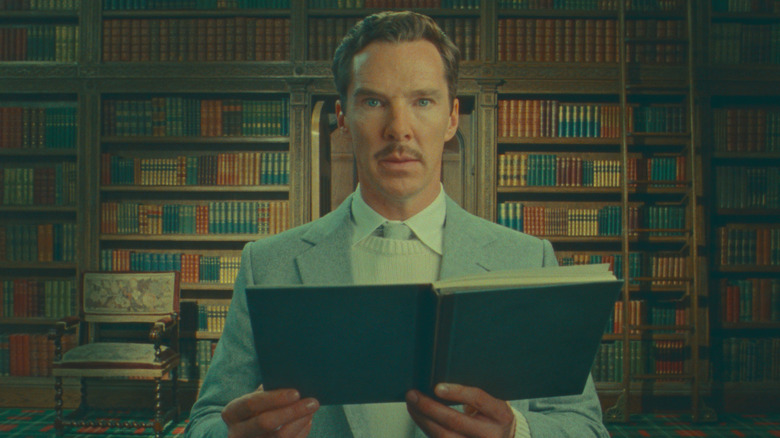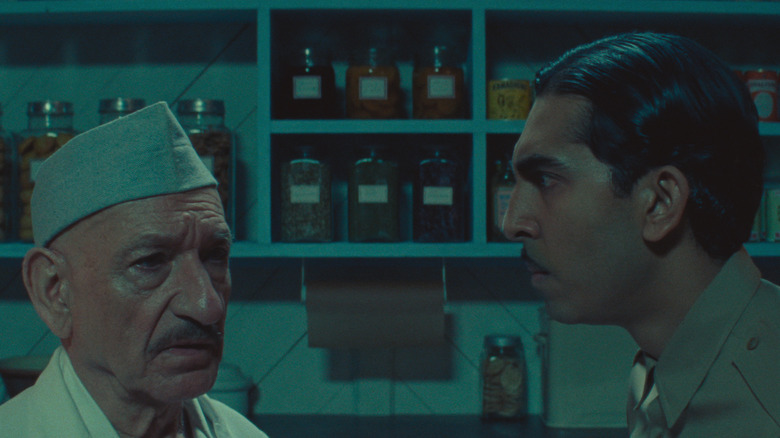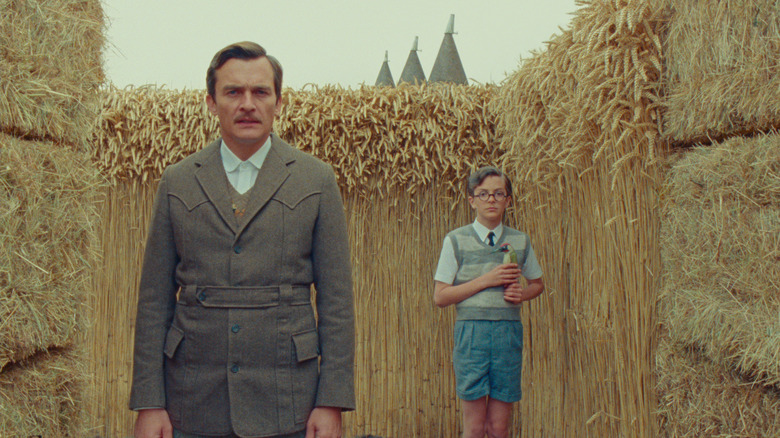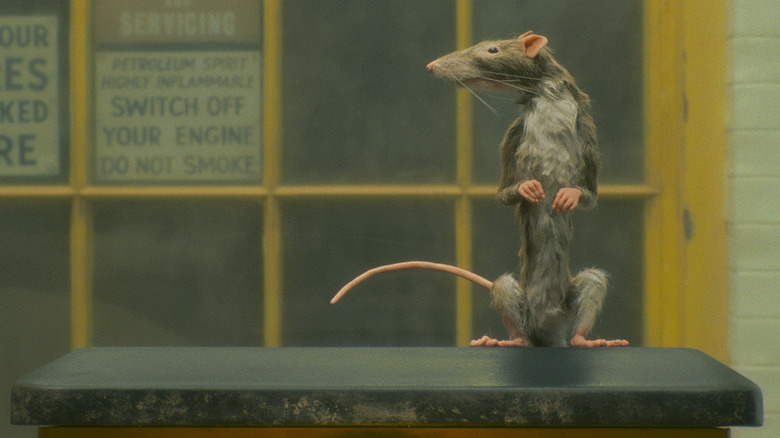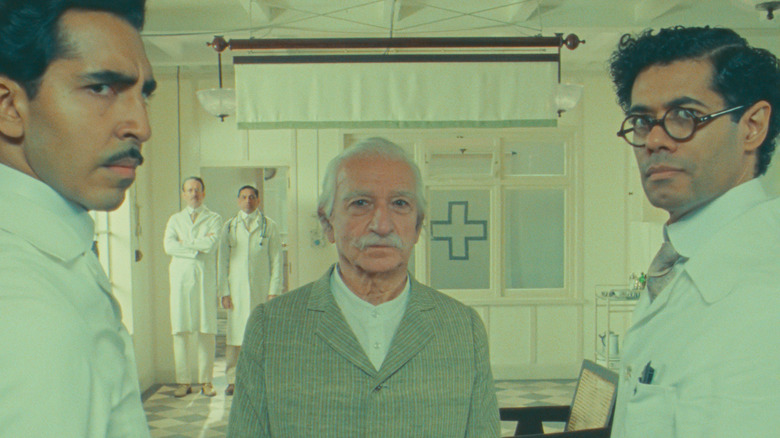All Of Wes Anderson's Roald Dahl Netflix Shorts Ranked
Did you know that there are four brand new short films written and directed by Wes Anderson that are adapted from short stories by Roald Dahl and available for you to watch on Netflix right now? It would not surprise me in the slightest if you didn't. I know short films are not the biggest attention grabbers, but this is one of the best and most recognizable American auteurs taking on the work of one of Britain's most beloved authors of the 20th Century. Surely, you would want the word to get out there about this, especially given how successfully Anderson previously adapted Dahl's work with his stop-motion adaptation of "Fantastic Mr. Fox." Alas, Netflix made the plans for these shorts very unclear and definitely did not effectively communicate their release strategy, with one coming out every day for four days. The first short, "The Wonderful Story of Henry Sugar," did play at the Venice International Film Festival, but even if you knew that existed, the other three might have passed you by.
That lack of promotion is even more frustrating because all four of these short films are wildly entertaining and contain some of the most visually inventive and dynamic design work of Anderson's career. Creatively, Anderson has been on such a heater with "Asteroid City" and the wildly underrated "The French Dispatch," and this Roald Dahl tetralogy continues to see the director firing on all cylinders. With a six-person troupe of Ralph Fiennes, Rupert Friend, Dev Patel, Benedict Cumberbatch, Richard Ayoade, and Ben Kingsley, Anderson has pushed the artifice and theatricality of his already heightened style further than it has ever gone before to winning results. Let's run through these four short films and see how they stack up against one another.
4. Poison
Placing something as the worst on this list is only done as a formality and not a mark of a lack of quality. In fact, "Poison" being the lowest on this list should only tell you just how great this collection is. Set in India during the British Raj, Dev Patel serves as the short's narrator, telling the story of how he encountered his friend (Benedict Cumberbatch) lying still in bed because a highly venomous krait has fallen asleep on his stomach. They enlist the help of local doctor Gandebai (Ben Kingsley) to help solve the predicament.
The reason I place this at the bottom is because this short does lack a formal invention that the other three have. Because it is primarily set in one room, there isn't as much fun Anderson can have with breaking apart the set or finding camera angles and movements that stylistically push things forward. There are brief moments, such as shooting the set directly from the ceiling where Patel has to crane his neck upwards to directly address the camera or a couple of instances of split screen, but they are few and far between.
Where the short does succeed wildly, though, is in its tension building. You normally don't think of Anderson as someone to make a pressure cooker thriller, but that is exactly what "Poison" is. Because his tone is so controlled, he has the ability to lock in on that pressure and never let it go until he needs it to explode. The explosion itself is effectively startling, and the somberness with which it ends, as the film directly addresses the racism and colonization by the British, works as a perfect gut punch. "Poison" was the last short to be released, and it's a fitting ending to this tetralogy.
3. The Swan
Because Roald Dahl is primarily a children's author, people are often surprised to remember just how bleak his work can be, even though nearly every story he ever wrote prominently featured that bleakness. "The Swan" swerves into that bleakness head-on with a story about people being cruel to a boy for seemingly no reason at all other than they can be. Here, Rupert Friend takes on the role of the narrator, playing a grown-up version of Peter (Asa Jennings). When he was a child, a group of boys decided to bully young Peter for fun, which included binding his arms and legs and placing him on a train track. Peter is also a bird lover, and he is forced to watch a swan be killed, have its wings chopped off, and then he's made to jump off a tall tree with the wings tied to his arms.
Mind you, none of this horror is explicitly shown on screen. It is all conveyed through stagecraft tricks and a breathless performance from Friend. We see him and Asa Jennings, playing the young Peter, traversing a maze of wheat and hay as Friend recounts the tale, as stagehands pop in and out of secret doors in the maze to display props and costumes to support the storyteller. When he lays on the railway tracks, we see no train but instead see the grass tilt to one side as if blown by the wind caused by the speeding train. Wes Anderson has grown fonder of using theatrical techniques like this in his films, and he packs more in these 17 minutes than he has in whole features. It's thrilling to watch and always works in conjunction with the story rather than obfuscate it. A wonderful melding of form and function.
2. The Rat Catcher
Ralph Fiennes' primary role in this set of four short films is to play Roald Dahl himself, acting as the super structure in all four of these films as the ultimate narrator sitting in his writing chair. But in "The Rat Catcher," Fiennes also gets to take on the titular role, and it has quickly become one of my favorite performances of his in recent years. The title is accurate, and Fiennes plays a man whose job it is to catch rats. And he takes this job very seriously. This is a man who prides himself on being able to think like a rat, knowing exactly which tactics would work for which rats, and even keeps rats in his pockets just to be close to the animal. He is an utterly bizarre creation and elevates one of the formally less adventurous shorts into something truly stunning.
However, the short is not without its stylistic flourishes, especially in the climax. First, we get the only major use of stop-motion animation with one of the rats Fiennes has on him. Then, Wes Anderson goes into full horror mode when the titular character gets into a head-to-head battle with a rat, which has taken the form of Rupert Friend. The film moves into a series of harshly lit, tilted close-ups of the two men, where Fiennes looks nearly like Nosferatu or some such monster. It's a complete departure from Anderson's typical symmetrical, flat framing while never losing its sense of intentionality and precision. Even with all this, "The Rat Catcher" is probably the funniest of the four shorts, with Fiennes being able to use his awkward energy as skillfully for laughs as he does tension. A strange short film, to be sure, but one of the most exhilarating.
1. The Wonderful Story of Henry Sugar
I'm a little annoyed with myself that I'm placing "The Wonderful Story of Henry Sugar" at the top of this list. After all, the other three all run around 17 minutes long, and this one gets up around 40. It has time to breathe and change up what it's doing far easier than its counterparts. But I can't help it. "The Wonderful Story of Henry Sugar" is some grade-A Wes Anderson material, and it needs to be recognized as such.
Especially in the last decade, Anderson has become obsessed with stories about storytelling and constructing his films in a nesting doll structure, and that is perfectly suited for this tale about the titular man (Benedict Cumberbatch) reading a story about two doctors (Dev Patel and Richard Ayoade) in India who encounter a man who can see without using his eyes (Ben Kingsley), and the lesson he learns from it is wanting to be able to win big at casinos by seeing cards during blackjack. Keep in mind, this is still all within the Ralph Fiennes as Roald Dahl superstructure.
What I love about "Asteroid City," "The French Dispatch," and "The Grand Budapest Hotel" is how Anderson understands that stories aren't meant to be understood but to make us reflect on ourselves and our lives. We may take one thing away from a story and realize that what we did came from a place of fault within ourselves. "The Wonderful Story of Henry Sugar" directly addresses this connection we have with the stories we encounter in such beautiful and exciting ways. It also features all the comedy and cinematic invention you would hope from an Anderson film as well. It's the perfect blend of everything he does so well packed into 39 minutes. A real triumph.
